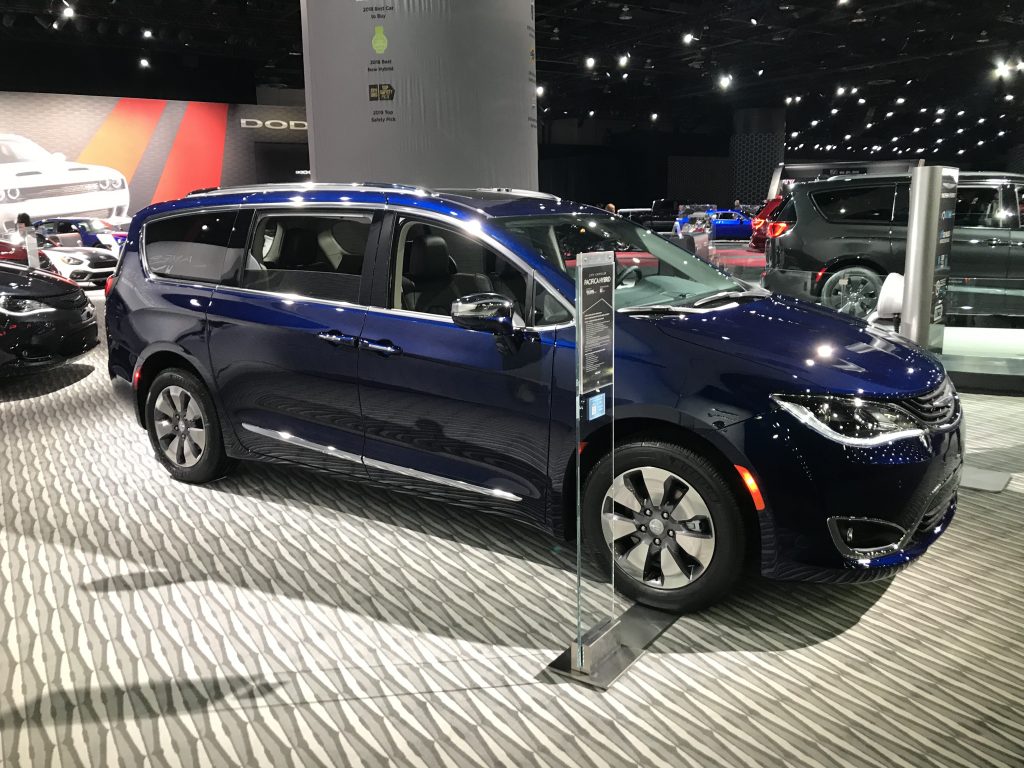FCA To Merge With French Automaker: What Does It Mean?
Fiat Chrysler, Peugeot are coming together. Deal is not expected to affect new Detroit factory.

The boards of Fiat Chrysler and Peugeot have announced plans to merge, creating the world’s fourth-largest car company. The new automaker would be capable of building more than 8.5 million vehicles worldwide every year.
Automotive journalist Paul Eisenstein says it seems to be a good fit. The publisher of The Detroit Bureau web site says FCA and Peugeot’s parent, Groupe PSA, have a better chance of success as a single company than they do separately. He says automaker are under a lot of pressure to survive changing trends in the auto industry, such as tougher fuel economy and emissions standards.
“The cost of meeting all these, plus other technological demands such as autonomy, are close to breaking the bank for some of the smaller manufacturers,” Eisenstein says.
“Basically, they need to pair up to be able to afford being able to stay alive.” — Paul Eisenstein, The Detroit Bureau
Eisenstein says it could take more than a year to close the deal, which requires regulatory and shareholder approval.
More from WDET
UAW Strike Against GM: Costly, But Not Catastrophic for Corporate Profits
Want One of FCA’s 5,000 Promised Jobs? Get In Line
What Detroit’s Eastsiders Want to See From Fiat Chrysler to Improve Air Quality
Click on the player above to hear Paul Eisenstein’s conversation with WDET’s Pat Batcheller, and read a transcript, edited for clarity, below.
Pat Batcheller, 101.9 WDET: Why are these companies merging?
Paul Eisenstein, The Detroit Bureau: If you look at what’s happening in the industry, automakers are under tremendous pressure from traditional competition and regulators who are demanding tougher mandates for things like fuel economy and emissions. The cost of meeting all these, plus the cost of technological demands such as autonomy, are close to breaking the bank for some of the smaller manufacturers. Basically, they need to pair up to stay alive.

Why does this merger between these two companies make sense?
It seems like they have a good fit. Where one is strong, the other is weak. In a few cases where they’re both weak, they feel they can do better. In China, for example, by teaming forces they hope to gain a better foothold in the world’s largest car market.
Which one is the weaker of the two?
Probably Fiat Chrysler. They’ve got a lot of holes in its operation. It’s been behind in terms of its electrification and autonomous vehicle efforts. That said, PSA has a couple of big weaknesses. For example, it has not been in the U.S. market for a quarter of a century. It’s been trying to make a comeback, but the plan it has outlined is likely to take a full decade without some help from Fiat Chrysler.
So what’s the next step in the merger process?
It’s probably going to be moderately slow. Now that we have an agreement, you’ll see an MOU, a memorandum of understanding, soon. I’ve been told it’s possible we could see it completed as early as next summer. But the reality is, as I was told by a very deep insider, it might take a year or longer. There’s going to be a lot of regulatory review, and it will have to go before shareholders for approval.
How might the merger affect FCA’s contract talks with the United Auto Workers, which follow agreements between the union and the other domestic automakers?
We don’t know yet. I’ve talked to some people around the talks, and what we’re likely to see is the union asking how this will affect jobs. Whenever there’s a merger, there’s a rationalization, and that could mean FCA and PSA, and whatever they become, will have to start thinking about plant closings and layoffs. They’re going to be under intense pressure from the French government, which owns a little more than 12% of PSA, not to cut operations in France. And we will certainly see some pressure not to do any major cutting here in North America. I can tell you this: We are not going to see them walk away from some of the big plants they’ve put up. They converted a Sterling Heights plant to make trucks and they have a massive operation in Auburn Hills, of course. Don’t expect to see any major cuts in those locations.
What about the new factory being built on Detroit’s east side?
I wouldn’t worry about that. As long as truck demand is there, they’re going to be pumping out as many trucks as they can from that operation.
Shifting gears to Ford, what might be in its agreement with the United Auto Workers?
We know it’s a pattern based on what they got out of General Motors. Signing bonuses will be less. It appears Ford has agreed to invest about $6 billion in products and plants in North America. I expect some of that will cover electrification or electric vehicles in some form.
(Editor’s note: An Associated Press report says the Ford-UAW tentative agreement includes signing bonuses of $9,000 for each hourly worker and the closure of the Romeo engine plant.)
Were you surprised the Ford and the UAW reached an agreement so soon after the GM strike ended?
I was surprised it lasted three days. From what I know, they basically worked out a settlement before they named GM its strike target. They had a good percentage of the contract done before they broke off to focus on GM, and I’m sure that there were a few details they got out of GM that tweaked what they got from Ford. There’s some talking that goes on with all companies, and I”m sure they’ve been talking with FCA. I can’t say there will be a quick agreement, there are a lot of challenges, including questions about what the union will be facing with the merger.
